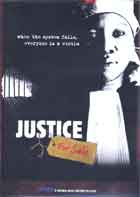
Justice for Sale 2011
Distributed by Women Make Movies, 462 Broadway, New York, NY 10013; 212-925-0606
Produced by IF Productions
Directed by Ilse Van Velzen and Femke Van Velzen
DVD, color, 83 min.
Jr. High - General Adult
African Studies, Crime, Ethics, Post Colonialism, Women’s Studies
Date Entered: 08/22/2012
Reviewed by Patricia B. McGee, Coordinator of Media Services, Volpe Library & Media Center, Tennessee Technological UniversityJustice for Sale is a fascinating exploration of corruption in the justice system of the Democratic Republic of Congo. The film follows the heroic efforts of Congolese lawyer Claudine Tsongo to discover the truth behind the conviction and harsh sentencing of Adjutant Masamba Masamba for rape. In early May 2008 Captain Mbala and his wife Sifa went to Masamba’s home for a healing potion. They swear that the healer drugged the captain and raped Sifa Mbala. Masamba on the basis of inconsistent and contradictory evidence, including testimony from the examining physician that the alleged victim had no evidence of sperm indicating sexual assault, but had a serious vaginal infection, was sentenced to serve a term of ten years and to pay $900 compensation to the alleged victim.
Lawyer Tsongo painstakingly backtracked the trail of all the available evidence. She found the victim said she was assaulted on May 13th, but she went to the hospital on May 11th while according to the police report the rape happened on the 12th. Both Masamba and his wife thought he was “in jail for the lost phone of Mbala.” She was “astonished to hear he [was] accused of rape.” Masamba’s case was investigated by military officers; one offered to create a story for him if paid a bribe. He was convicted by a military tribunal.
It is undeniable that sexual assault has been a major problem in the Congo; Lisa Jackson’s 2007 The Greatest Silence: Rape in the Congo bears brutal witness to that horror. The Democratic Republic of Congo to its credit is waging a war with the help of non-governmental agencies against rape with impunity, but in the process while lawyers for the prosecution are given stipends, the rights of the accused are ignored. Claudine Tsongo came to the conclusion that Masamba was wrongly convicted; he was a “victim of a legal system that is based more on money than rights.” Unfortunately his appeal was lost and too much time has elapsed for any more legal remedy; his only option is the possibility of a presidential pardon. She has been unable to convince the courts to reopen Masamba’s case.
Masamba’s life since his conviction provides a cruel contrast to the warm nurturing family life of Claudine Tsongo. He has lost his wife and all contact with his children, been forced to sell his clothes for food, and has a deep and wracking cough. However, since the showing of the film the Congolese Ministry of Justice is willing to consider reviewing the case under a special appeal process in the High Military Court of Kinshasa.
Justice for Sale is a dispassionate, in depth examination of a complicated and difficult issue. The film leaves the viewer with more questions than answers, but it is a brilliant exposition of a vital and complex problem. In the words of Claudine Tsongo, “The Congolese justice system does not inspire confidence.” Highly recommended and absolutely necessary for all African studies programs.